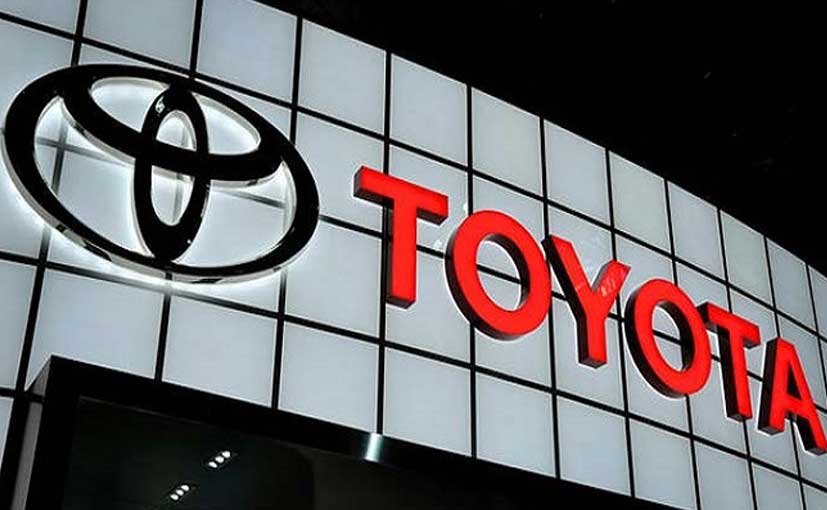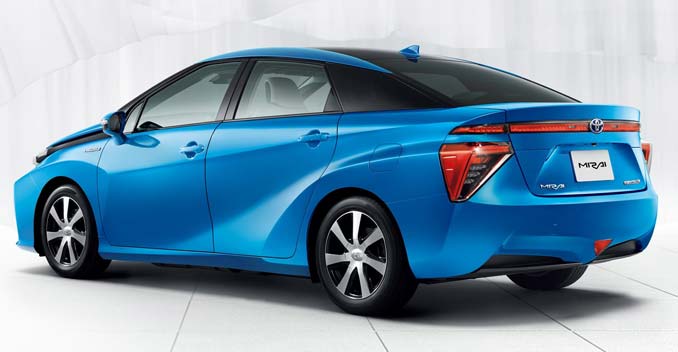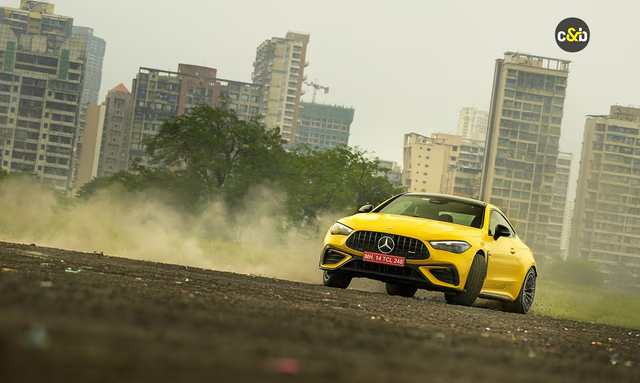Toyota Goes Down The Toilet, Literally

- Toyota is converting sewage sludge and human waste into hydrogen
- The process is taking place at the Fukuoka Water Processing Plant, Japan
- The plant produces 300Kg of hydrogen per day, enough to fuel 65 Mirais
In a bid to aid in solving the global warming crisis, Toyota might soon start using human waste to power its upcoming electric cars. Apparently, the Japanese auto giant has found a way to convert sewage sludge, which is mostly made up of human waste, into hydrogen that can fuel cars like the Mirai.
Apparently, for this special project, it looks like Toyota is working in conjunction with the Fukuoka City Central Water Processing Plant, in Fukuoka, Japan. Usually, sewage in such water treatment plants is separated into liquid and solid waste. The solid waste called sewage sludge, which is a foul-smelling, brown lump that mostly ends up in landfills. But the folks at Fukuoka try to extract as much good from it as possible. Microorganisms are added to the mix, which breaks down the solid waste, creating biogas that is made up of about 60 per cent methane and 40 per cent carbon dioxide. Then, workers filter out the CO2 and add water vapour, which creates hydrogen and more CO2. They extract the CO2 again, and voila: pure hydrogen.

Now before you go ahead and start praising the Japanese for their smart idea let us tell you, the process is not new or any advanced technology. In fact we Indians have been doing the same thing for years, and that is exactly what Marc Melaina, a senior engineer at the National Renewable Energy Laboratory in Denver pointed out. He said, "In India, they have loads of biogas plants in villages and such that are just part of their energy infrastructure."
Essentially the sewage sludge, as mentioned earlier, is usually dumped in landfills, and in the case of biogas, it's most often burnt. In other words, there's no downside to using it to produce hydrogen instead. "They have to treat the water, and biogas is a natural by-product of that process," Melaina says. "You can burn it, you can turn it into electricity or you can turn it into hydrogen."
Now, Toyota has been one of the few carmakers, who have been continuously working to find new natural and sustainable fuel source to build zero-emission cars. While hydrogen fuel cells have proven to be an excellent option, Yoshikazu Tanaka, the chief engineer of the Toyota Mirai, Toyota's hydrogen fuel cell car, calls it a "chicken or the egg" problem. Apparently, no one wants to purchase hydrogen cars because there are no hydrogen fuel stations, and nobody wants to build hydrogen fuel stations because there are no hydrogen cars.
This is why Tanaka and several other experts feel that making hydrogen from sewage is probably one of the most economical ways to get sustainable fuel source for hydrogen-powered electric cars. To prove his point Tanaka said that currently, the Fukuoka plant produces 300 kg of hydrogen per day, enough to fuel 65 Mirai vehicles. If all the biogas produced by the plant were converted to hydrogen, that number would jump to 600 cars per day.
Source: Quartz (qz.com)
Latest News
 car&bike Team | Feb 19, 2026KTM 390, 250 Adventure Offered With Free Accessories And 10-Year Extended WarrantyThis limited-run scheme is offered until February 28 on both motorcycles.2 mins read
car&bike Team | Feb 19, 2026KTM 390, 250 Adventure Offered With Free Accessories And 10-Year Extended WarrantyThis limited-run scheme is offered until February 28 on both motorcycles.2 mins read Jaiveer Mehra | Feb 19, 2026Volkswagen Tayron Launched In India at Rs 46.99 LakhThe Tayron is essentially the successor to the now-discontinued Tiguan Allspace and features three rows of seating.1 min read
Jaiveer Mehra | Feb 19, 2026Volkswagen Tayron Launched In India at Rs 46.99 LakhThe Tayron is essentially the successor to the now-discontinued Tiguan Allspace and features three rows of seating.1 min read car&bike Team | Feb 19, 2026Hyundai Exter Facelift Spied In South KoreaThe Exter facelift was spotted testing in India earlier this year.2 mins read
car&bike Team | Feb 19, 2026Hyundai Exter Facelift Spied In South KoreaThe Exter facelift was spotted testing in India earlier this year.2 mins read Bilal Firfiray | Feb 19, 2026Tata Punch EV Facelift To Be Launched Tomorrow: What To Expect?Launched in 2024, the Punch EV is due for a major update. And more than cosmetic changes, it will have some skin-deep updates too.1 min read
Bilal Firfiray | Feb 19, 2026Tata Punch EV Facelift To Be Launched Tomorrow: What To Expect?Launched in 2024, the Punch EV is due for a major update. And more than cosmetic changes, it will have some skin-deep updates too.1 min read car&bike Team | Feb 18, 2026Kia Seltos Achieves 6 Lakh Unit Sales MilestoneThe Seltos was Kia’s first product in India, having been launched in August 2019.2 mins read
car&bike Team | Feb 18, 2026Kia Seltos Achieves 6 Lakh Unit Sales MilestoneThe Seltos was Kia’s first product in India, having been launched in August 2019.2 mins read Bilal Firfiray | Feb 18, 2026Maruti Suzuki e-Vitara Full Price List Revealed, Starts At Rs 15.99 LakhYesterday, the BaaS (battery as a service) pricing was out. Now Maruti has given the non-BaaS pricing of the all-new e-Vitara2 mins read
Bilal Firfiray | Feb 18, 2026Maruti Suzuki e-Vitara Full Price List Revealed, Starts At Rs 15.99 LakhYesterday, the BaaS (battery as a service) pricing was out. Now Maruti has given the non-BaaS pricing of the all-new e-Vitara2 mins read
 Jaiveer Mehra | Feb 18, 2026New BMW X3 30 Vs Mercedes-Benz GLC 300: Midsize Luxury SUV FaceoffWith the new X3 30, BMW has a direct competitor to the petrol GLC 300, but which is the luxury SUV for you?1 min read
Jaiveer Mehra | Feb 18, 2026New BMW X3 30 Vs Mercedes-Benz GLC 300: Midsize Luxury SUV FaceoffWith the new X3 30, BMW has a direct competitor to the petrol GLC 300, but which is the luxury SUV for you?1 min read Jafar Rizvi | Feb 15, 2026Maruti Suzuki Victoris: Long-Term Review - Report 1The Victoris is Maruti’s latest offering for the Indian market, and after spending some time with it, here are a few early impressions.1 min read
Jafar Rizvi | Feb 15, 2026Maruti Suzuki Victoris: Long-Term Review - Report 1The Victoris is Maruti’s latest offering for the Indian market, and after spending some time with it, here are a few early impressions.1 min read Bilal Firfiray | Feb 12, 2026BMW X3 30 xDrive M Sport Review: The Driver’s SUV ReturnsRange-toppingX3 30 xDrive M Sport brings back the fun with 255bhp and genuine enthusiast appeal. Does this performance-focused SUV stand out?5 mins read
Bilal Firfiray | Feb 12, 2026BMW X3 30 xDrive M Sport Review: The Driver’s SUV ReturnsRange-toppingX3 30 xDrive M Sport brings back the fun with 255bhp and genuine enthusiast appeal. Does this performance-focused SUV stand out?5 mins read Bilal Firfiray | Feb 11, 2026Mercedes-AMG CLE 53 Coupe Review: The Goldilocks AMG?The Mercedes-AMG CLE 53 Coupe is a concoction of hooliganistic performance and everyday usability. Here’s why this Rs 1.5 crore two-door AMG might be the perfect modern sports coupe for India.6 mins read
Bilal Firfiray | Feb 11, 2026Mercedes-AMG CLE 53 Coupe Review: The Goldilocks AMG?The Mercedes-AMG CLE 53 Coupe is a concoction of hooliganistic performance and everyday usability. Here’s why this Rs 1.5 crore two-door AMG might be the perfect modern sports coupe for India.6 mins read Girish Karkera | Feb 11, 2026Toyota Ebella EV Review: Compact And Fun-To-Drive With The Promise Of Stress-Free AftersalesNo hiding the fact that it is a clone of the Maruti Suzuki eVitara, but the first all-electric Toyota in India is reasonably well-rounded8 mins read
Girish Karkera | Feb 11, 2026Toyota Ebella EV Review: Compact And Fun-To-Drive With The Promise Of Stress-Free AftersalesNo hiding the fact that it is a clone of the Maruti Suzuki eVitara, but the first all-electric Toyota in India is reasonably well-rounded8 mins read


































































































































